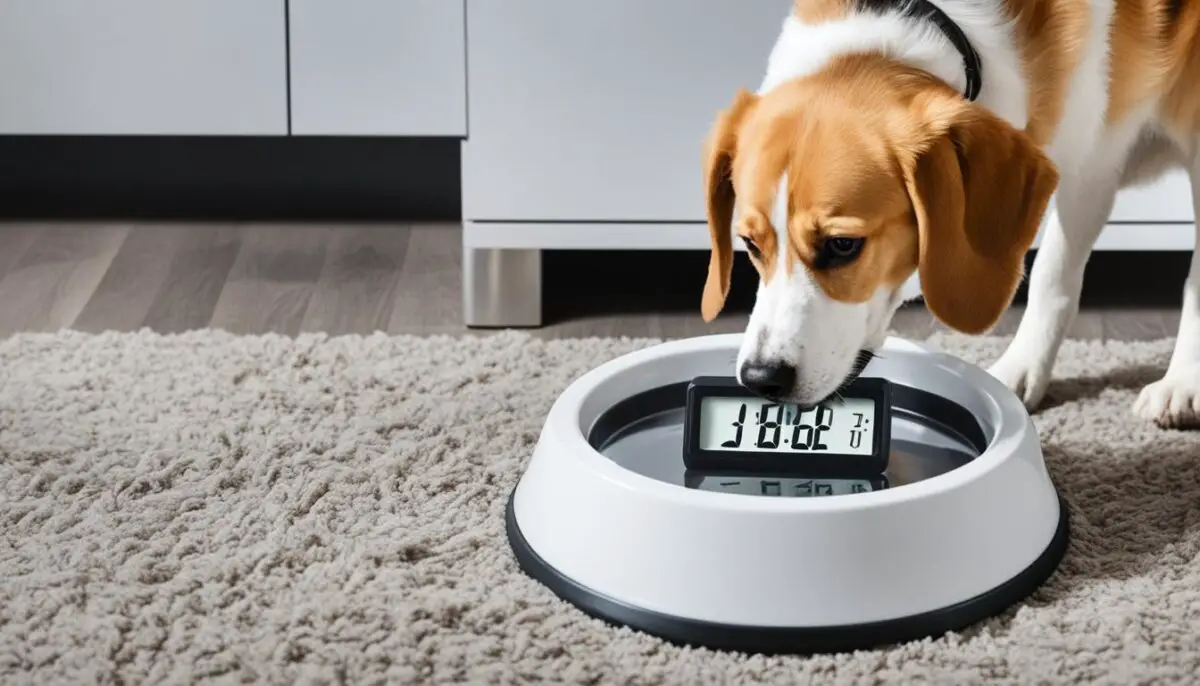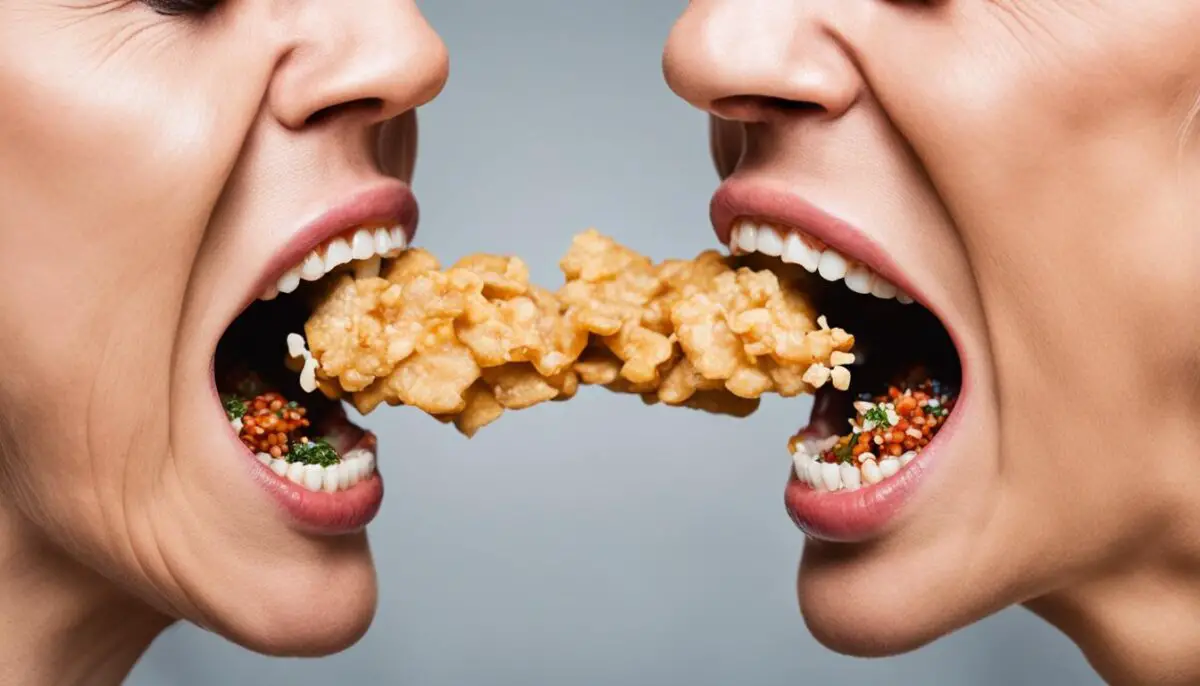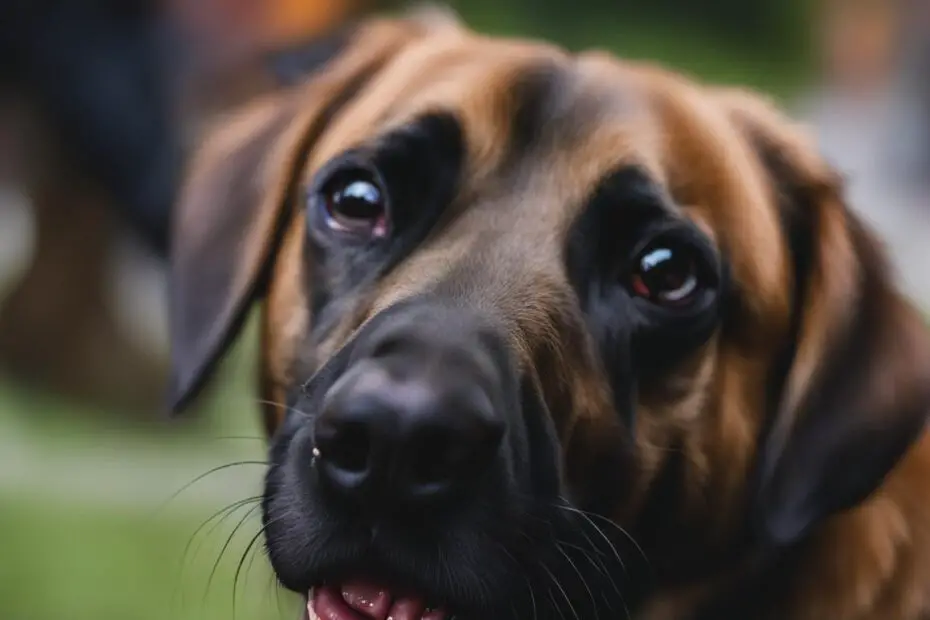Is your dog avoiding chewing its food? It’s not uncommon for dogs to gulp or swallow their food without chewing. Understanding the reasons behind this behavior is essential to ensure your dog’s overall health and wellbeing.
Dogs have a different set of teeth compared to humans, with only a few teeth designed for crushing or grinding. This means that chewing is not as crucial for dogs as it is for us. However, sudden changes in chewing behavior, such as a dog refusing to chew or having difficulty chewing, should not be ignored as it may indicate underlying dental issues or pain.
When it comes to food preferences, some dogs may choose to gulp their food whole, while others enjoy the crunchiness of kibble. However, if your dog starts dropping food, eating slower, or refusing to eat altogether, it’s important to consult with a veterinarian. These changes in eating behavior can be a sign of periodontal disease, oral inflammation, oral tumors, or oral trauma.
Key Takeaways
- It’s not uncommon for dogs to swallow food without chewing, but sudden changes in chewing behavior should be addressed.
- Consult with a veterinarian if your dog refuses to chew, eats slower, or exhibits other changes in eating behavior.
- Dogs have different dental structures and preferences when it comes to food textures.
- Chewing is essential for digestion, so dogs who gulp their food without chewing may experience digestive issues.
- Not chewing food may indicate dental diseases such as periodontal disease, endodontic disease, oral inflammation, oral tumors, or oral trauma.
Why Dogs Eat Fast and Swallow Food Whole
Some dogs have a natural instinct to eat fast and swallow their food whole. This behavior can be traced back to their wild ancestors, who had to compete for food and eat quickly to survive. In the wild, dogs had to finish their meals before other animals could steal their prey.
This instinctual behavior can still be observed in domesticated dogs, especially those living in multi-pet households. Dogs may feel the need to eat quickly to ensure they get their fair share of the food. This behavior is often seen in dogs that have to compete with other pets during mealtime.
While it is normal for dogs to eat fast occasionally, sudden changes in eating behavior should be monitored closely. If a dog suddenly starts eating at a fast pace and swallowing food whole, it may indicate an underlying health issue or parasite infestation.
If you notice your dog exhibiting fast eating behavior consistently or showing signs of discomfort, it is important to consult with a veterinarian. They can help determine if there are any underlying health issues causing this behavior and recommend appropriate treatment.
To better understand why some dogs eat fast, it is essential to consider their wild instincts and the need to compete for food. However, it is equally important to ensure their eating habits are not adversely affecting their health and well-being.
Instinctual Gulping in the Wild
In the wild, dogs had to rely on their instincts to survive. This meant they had to eat quickly and efficiently to avoid losing their food to other animals. The ability to gulp down food allowed them to secure their meals and stay nourished in challenging environments.
Domesticated dogs still retain some of these instinctual behaviors, even though their meals are readily available. These behaviors can be seen in fast eating and swallowing food whole. While it may not be necessary for survival in a domestic setting, these behaviors are deeply ingrained in a dog’s nature.
Understanding the reasons behind fast eating behavior can help dog owners address any potential issues and provide appropriate solutions to ensure their dog’s well-being.

The Importance of Chewing Food for Digestion
In the process of digestion for dogs, chewing or mastication plays a crucial role. When dogs chew their food, it breaks down into smaller pieces, which aids in the digestion process in the stomach and intestines. Proper chewing allows for the mechanical breakdown of food, increasing its surface area and exposing more of it to digestive enzymes.
The mouth and teeth play a significant role in this process. Dogs have different types of teeth, including incisors, canines, premolars, and molars. Each type of tooth serves a specific purpose in breaking down food. The incisors help with biting and cutting, while the canines are for tearing. The premolars and molars aid in grinding and crushing food.
Benefits of chewing food for dogs include:
- Improved nutrient absorption: When food is properly chewed, enzymes in the saliva can begin breaking down carbohydrates, making them easier for the body to absorb.
- Enhanced digestion: Chewing helps mix food with saliva, which contains digestive enzymes that facilitate the breakdown of proteins and fats.
- Reduced risk of choking: Chewing food thoroughly reduces the risk of large chunks getting stuck in the throat, preventing choking hazards.
- Promotion of dental health: Chewing stimulates saliva production, which helps maintain oral hygiene and reduces the risk of dental diseases such as periodontal disease and tooth decay.
On the other hand, dangers arise when dogs gulp their food whole without chewing. This improper eating behavior puts a strain on the digestive system, potentially leading to indigestion, discomfort, and even gastrointestinal blockages. One severe condition related to fast eating is gastric dilatation-volvulus (GDV), where the stomach twists and traps gas, causing bloating and potentially life-threatening complications.
Encouraging proper chewing behavior in dogs is essential for their overall health. Providing dogs with appropriate-sized kibble or wet food that requires chewing promotes a healthier eating pace and ensures that meals are thoroughly broken down before they reach the stomach. Additionally, incorporating dental chews or toys specifically designed to encourage chewing can help improve dental health and satisfy the natural urge to chew.
| Benefits of Chewing Food for Dogs |
|---|
| Improved nutrient absorption |
| Enhanced digestion |
| Reduced risk of choking |
| Promotion of dental health |

By understanding the importance of proper chewing and taking steps to promote it, dog owners can help maintain their pet’s digestive health and overall well-being.
Potential Health Issues Associated with Not Chewing Food
Not chewing food can have serious implications for a dog’s dental and oral health. There are several potential health issues that can arise from this behavior, including:
- Periodontal Disease: Dogs who don’t chew their food miss out on the natural cleaning action that chewing provides, leading to an increased risk of periodontal disease. This condition is characterized by inflammation, infection, and damage to the gums, teeth, and underlying bone structures.
- Endodontic Disease: The lack of chewing can also contribute to endodontic problems, which affect the dental pulp and root canal system. This can result in severe toothaches, tooth abscesses, and the need for root canal treatments or extractions.
- Oral Inflammation: When food is not properly chewed, it can cause irritation and inflammation in the oral cavity, leading to discomfort and potential infection.
- Oral Tumors: Dogs that swallow their food without chewing may be more susceptible to developing oral tumors. These tumors can be benign or malignant and may require surgical intervention.
- Oral Trauma: Swallowing large pieces of food without chewing can also lead to oral trauma, such as scratches or lacerations in the mouth or throat.
It is important to recognize the symptoms of dental and oral issues in dogs, which can include bad breath, excessive drooling, difficulty eating, pawing at the mouth, swollen or bleeding gums, and changes in behavior or appetite. Regular dental check-ups with a veterinarian and proper oral hygiene can help prevent and detect these problems early on.
In severe cases, treatment for these health issues may involve dental cleanings, antibiotics, surgical procedures, or medication. Early intervention and proper dental care can not only improve a dog’s oral health but also contribute to their overall well-being.
Remember, a healthy mouth leads to a healthier dog!
Tips for Slowing Down a Dog’s Eating
To promote healthier eating habits and prevent dogs from gobbling their food, there are several effective strategies that owners can implement. One method is to use slow feeder bowls or puzzle toys specifically designed for dogs. These feeding tools add obstacles to the food bowl, making it more challenging for the dog to access the food quickly. By slowing down the eating process, dogs are encouraged to take smaller bites and chew their food.
Another option is to incorporate treat dispensing toys into mealtime. These toys require the dog to interact and work for their food, turning mealtime into an enjoyable and mentally stimulating experience. This not only slows down the eating pace but also provides entertainment and enrichment for dogs.
For those looking for a more natural approach, some owners choose to spread the food on the ground. By doing so, dogs are encouraged to use their nose and engage their scavenging instincts to find and consume their meal. This method not only slows down their eating but also adds a fun and interactive element to their feeding routine.
Overall, alternative feeding methods such as slow feeder bowls, puzzle toys, or spreading food on the ground can help dogs slow down their eating and promote better chewing. These strategies not only reduce the risk of choking or digestive issues but also provide mental stimulation and enhance the overall well-being of our furry friends.
FAQ
Why is my dog not chewing its food?
There can be several reasons why a dog may refuse to chew its food. It could be due to dental issues, such as periodontal disease or oral inflammation. It is important to consult with a veterinarian to identify any underlying health concerns.
What are the potential health issues associated with a dog not chewing its food?
Not chewing food can be a sign of dental diseases, such as endodontic disease or oral tumors. These conditions can range from mild to severe and may require different treatment approaches. Early identification and treatment are crucial for your dog’s well-being.
How can I slow down my dog’s eating and promote chewing?
There are various strategies you can try. Using slow feeder bowls or puzzle toys adds obstacles to the food bowl, encouraging your dog to take smaller bites and chew their food. Treat dispensing toys can also be used to turn mealtime into playtime, promoting mental stimulation and slower eating.
Why do dogs eat fast and swallow food whole?
Dogs may eat fast and swallow food whole due to instinctual behavior inherited from their wild ancestors. In the wild, dogs had to eat quickly to survive and compete for food. However, sudden changes in eating behavior may indicate underlying health issues, and it is important to monitor any changes and consult with a veterinarian if necessary.
What is the importance of chewing food for a dog’s digestion?
Chewing plays a crucial role in the digestion process for dogs. It breaks down food into smaller pieces, facilitating digestion in the stomach and intestines. Dogs who gulp food without chewing put a greater strain on their digestive system, potentially leading to digestive issues. Proper chewing behavior supports healthy digestion.

